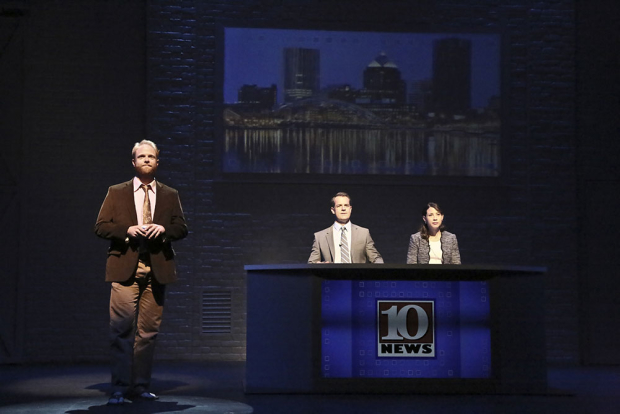The Power of Duff

(© Michael Lamont)
The Power of Duff commingles the dangerous elements of faith and mass media. The Geffen Playhouse is now presenting playwright Stephen Belber's comedy, the first production since its 2013 premiere at Huntington Theatre Company in Boston.
Charlie Duff (Josh Stamberg), a washed-up anchor, reads the local news twice every night at an upstate New York station and drowns his sorrows in womanizing. He has long ago ruined his marriage, and his teenage son (Tanner Buchanan) refuses to speak to him. The bough breaks when Charlie's father dies. Distraught, he takes a minute out of his next news report to pray for his dad. Then the next night, he prays for all his viewers' loved ones. His nightly prayers become a ritual — to the consternation of his news director (Eric Ladin), at least until the ratings start climbing. A cult grows around Charlie when his prayers inexplicably lead to positive outcomes, but then circumstances soon spiral out of control.
The Power of Duff follows the trail brilliantly blazed by Paddy Chayefsky in his Oscar-winning screenplay Network. Both tales focus on news anchors ignoring their impartiality by turning into modern-day religious prophets. However, Belber's play lacks the sting of the prescient 1976 film. The protagonist Duff appears to have magical powers in his prayers, thus stripping the storyline of any subtlety.
As one character mentions, news channels long ago abandoned objective reporting, proselytizing to their viewers and promoting their own agenda, whether left or right wing. It is that very statement which exposes the holes in this satire, with the play saying nothing that even the least cynical do not already believe about present-day journalism. The script is filled with bombastic speeches that drag down the intended wit, and the story veers off in too many directions, attempting to tackle everything from father-son disharmony to manic depression, leaving none of these roads well traveled.
Stamberg is smug as the local celebrity, but not dynamic enough to elicit shock or interest. Elizabeth Rodriguez shrilly projects her lines to convey her character's exhaustion but instead she conveys monotony. Brendan Griffin is appropriately manic as the zany sportscaster, but even his characterization cannot elevate the script's stale jokes. Though we've seen the character of Ladin's smarmy producer before, he creates a relatable figure, evoking the boss many audience members probably have and hate. Joe Paulik plays several characters distinctively, including a feature reporter who produces inane human-interest pieces (like nude ice skating) without a sense of irony.
The set by Clint Ramos revolves around Aaron Rhyne's projections and combines television screens with a brick wall to serve as a canvas for the video simulations of locations. Some of the projections look amateurish, even for a local news station. And one supposed CNN report resembles the video and sound quality of a high school class project.
With religion becoming a central issue in politics today, and predictably in the coming election, the subject matter for The Power of Duff could not be more timely. Despite this, the script misses the opportunity to provide smart commentary on current events. In the end, this "Duff" lacks the power to offer anything more than limited characterizations and old clichés.










